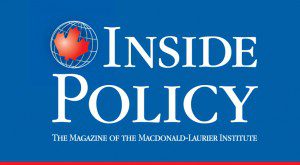 It is an overly expansive interpretation of US trade law, and frankly an abuse of power, for the Trump administration to impose unwarranted protectionist measures against steel and aluminum imports from allies such as Canada, writes former Republican Congressman Charles Boustany.
It is an overly expansive interpretation of US trade law, and frankly an abuse of power, for the Trump administration to impose unwarranted protectionist measures against steel and aluminum imports from allies such as Canada, writes former Republican Congressman Charles Boustany.
By Charles Boustany, June 11, 2018
The Trump administration has imposed tariffs on steel and aluminum imports from Canada, declaring these imports to be a threat to the national security of the United States. This notion is patently absurd. Canadian and American troops have fought side by side in major wars, Canada is a NATO ally, and Canadian aluminum has been strategically important to the United States for many years. The United States and Canada have shared in the defence of North America in close coordination through NORAD and collaboration in intelligence matters.
The Trump administration cited Section 232 of the Trade Expansion Act of 1962 as the basis of authority for the investigation and imposition of these tariffs. In accordance with that law, the Department of Defense must be consulted regarding the use of national security justification for the imposition of these tariffs. In a memorandum, the Secretary of Defense called into question this national security justification for applying these tariffs to Canada and other key allies, in stating “DoD continues to be concerned about the negative impact on key allies regarding recommended options within the reports.”
The Trade Expansion Act of 1962 was signed by President John F. Kennedy on October 11, 1962. It was hailed as President Kennedy’s most significant legislative victory in his first two years in office. In remarks upon signing the legislation, Kennedy cited it as the most important piece of international legislation since the Marshall Plan.
This bipartisan legislation gave Kennedy unprecedented authority to reduce tariffs and to negotiate trade agreements. Kennedy went on to say “… it marks a decisive point for the future of our economy, for our relations with our friends and allies, and for the prospects of free institutions and free societies everywhere. This act recognizes, fully and completely, that we cannot protect our economy by stagnating behind tariff walls, but that the best protection possible is a mutual lowering of tariff barriers among friendly nations so that all may benefit from a free flow of goods.”
This bipartisan legislation was enacted during the height of the Cold War for the stated purposes of using trade agreements to:
- Stimulate the economic growth of the United States and maintain and enlarge foreign markets for products of the United States;
- Strengthen economic relations with foreign countries through the development of open and nondiscriminatory trading in the free world; and
- To prevent Communist economic penetration.
In Chapter 4 of this legislative act, Sections 231 and 232 addressed imports from Communist countries and the risk to national security. This same Section 232, a relic of the Cold War, is now being used by the Trump administration to impose tariffs on friends and allies under the pretense of protecting the national security of the United States.
This is an overly expansive interpretation of US trade law, and frankly an abuse of power to impose unwarranted protectionist measures against steel and aluminum imports from allies. The Trump administration is taking this abuse further by initiating an investigation to rationalize tariffs on automobiles and auto parts. It is ironic that the Trade Expansion Act of 1962 is being used to impose tariffs on allies, which is contrary to the Congressional intent of that law.
The Trump administration is taking this abuse further by initiating an investigation to rationalize tariffs on automobiles and auto parts.
Unilateral declaration of the national security exception is allowed under Article XXI of the General Agreement on Tariffs and Trade, but it is not to be used frivolously. In the absence of a true national security justification, the use of the national security exception will invite retaliation and could lead to proliferation of protectionist measures that would undermine the global trading system. The national security exception should not be used as an ordinary trade remedy or as a means to gain leverage in the course of trade negotiations – as Trump appears to be doing in the NAFTA negotiations.
The Trump administration has now embarked on this high-risk course. This will inevitably lead to a trade war if widespread retaliation against the United States occurs, which appears to be the case. The Trump administration is retreating from America’s leadership of the world’s trading system and alienating key allies in the process of doing so. This approach was on full display at the recent meeting of the G7 in Charlevoix.
In warfare, supply lines matter; in a trade war, supply chains matter. Supply chains for American companies will be increasingly vulnerable as a result of Trump’s retreat into protectionism. By invoking national security to provoke a trade war with allies, the Trump administration may very well achieve the opposite of its goal and do harm to American economic and national security.
Dr. Charles Boustany is a former member of the US House of Representatives and a retired physician. He is a partner at Capitol Counsel LLC.




